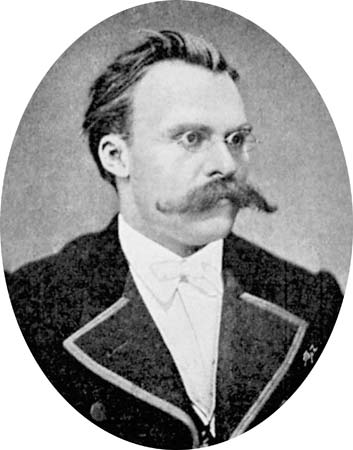Friedrich Nietzsche was a German philologist and philosopher in the nineteenth century. He was a pioneer of western nihilistic views, frequently questioning the existence of god, and the purpose and the usefulness of religion in society throughout his life. He also observed, and was a critic of the German culture that was developing.
Nietzsche was born in the Prussian city of Röcken on October 15th of 1844. He developed an interest in philology, the study of classical languages, at a young age. Nietzsche studied philology at the University of Bonn with the goal of eventually becoming a minister. However, after just one semester, Nietzsche discontinued his theological studies due to a loss of faith. Friedrich Nietzsche had grown up in a highly religious family because his father was a Lutheran minister and this halting of his pursuit of a career as a minister as well caused a divide between him and his family. At this time, Nietzsche began writing essays on the topic of religion. He argued that historical research had totally discredited the teachings of Christianity. He was offered a professor’s position at the University of Basel in that space in 1869 at age 24, before he had even completed his doctorate, becoming the youngest chair of classical philology in the university’s history. Before moving to Basel, Nietzsche renounced his Prussian citizenship. Despite this, he would go on to serve in the Prussian forces in the Franco-Prussian war a year later. Nietzsche served as a medical orderly and saw the horrors of war first-hand. As well as the emotional impact, Nietzsche contracted a handful of serious medical issues such as dysentery and syphilis that would worsen the health issues that had plagued him his entire life. Upon returning to Basel, Nietzsche published his first book, “The Birth of Tragedy”. He strayed away from the usual classical philological voice and took a more speculative stance. The book was largely unpopular, especially with his colleagues. Nietzsche began to feel out of place in the philological community and tried unsuccessfully to move in to the philosophical area of study at the University of Basel. Despite the unpopularity of his work, Nietzsche continued his writing by publishing a collection of essays criticizing the German culture that was developing around him. He then went on to publish “Human, All Too Human”, a book that contained observations on topics like metaphysics, morality, religion, gender studies and more. This would be the last work Nietzsche would publish at Basel. His health issues forced him to resign in 1879.
After Basel, Nietzsche lived off his pension from the university and financial aid from his friends. He travelled between cities constantly, seeking climates that accommodated his declining health, often spending his summers in Switzerland and his winters in Italy or France. Due to his failing eyesight, Nietzsche recruited his former student, Peter Gast, as a private secretary to proofread and type out his essays and books. During this period of his life, he would publish at least one book or major work a year, and as many as five in one year. Nietzsche’s work became increasingly erratic and alienating and was not received well by the public. In 1883, he tried to return to teaching at the University of Leipzig but failed to secure a post because of his views on Christianity. Nietzsche became bitter and isolated after this failure as his health continued to rapidly decline. In January of 1889, Nietzsche suffered a complete mental breakdown in Turin, Italy and was brought back to Basel where he fell totally into serious mental illness. The cause of his illness was linked to his syphilis and he began developing a stroke disorder. His strokes left him totally paralyzed in 1899 and after contracting pneumonia in August of 1900, he died.
Nietzsche’s works did not reach a significant audience during his lifetime, but in the century-plus after his death he has been recognized as an important figure in philosophy. He is considered the precursor to existentialism, post-modernism and other philosophical theories.
Duncan Simmons
Bibliography
Anderson, R. Lanier. 2017. “Friedrich Nietzsche.” Stanford Encyclopedia of Philosophy. March 17. https://plato.stanford.edu/entries/nietzsche/.
Hindley, Meredith. 2012. “Nietzsche.” Humanities, July/August.
Magnus, Bernd. 1999. “Friedrich Nietzsche.” Encyclopedia Britannica. July 26. https://www.britannica.com/biography/Friedrich-Nietzsche.
The School of Life. 2014. PHILOSOPHY-Nietzsche. October 10. https://www.youtube.com/watch?v=wHWbZmg2hzU.
Wilkerson, Dale. n.d. Internet Encyclopedia of Philosophy. http://www.iep.utm.edu/nietzsch/#H8.
